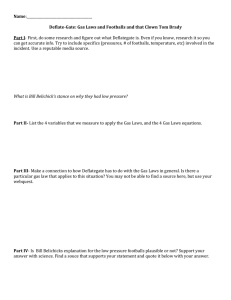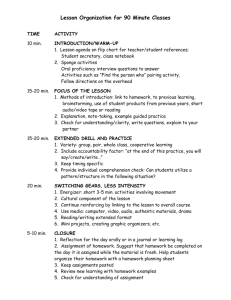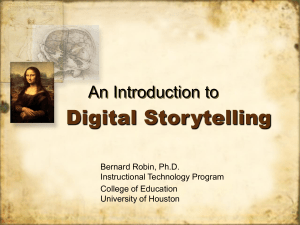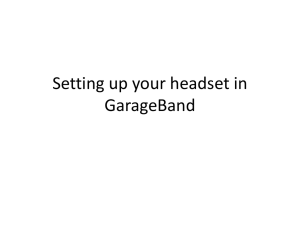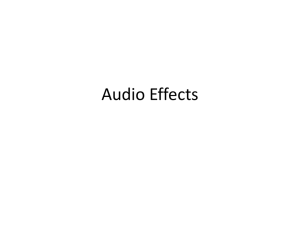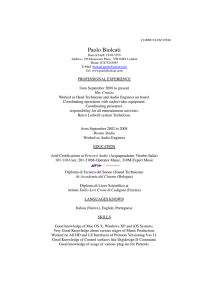47 Footballs!
advertisement
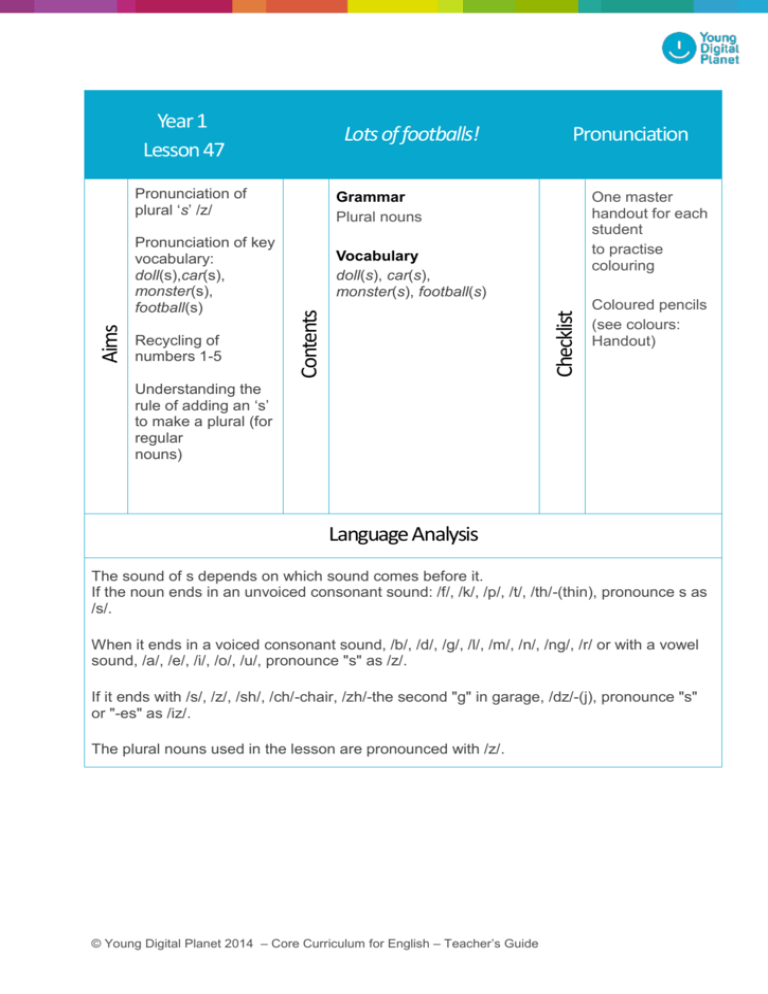
Lots of footballs! Pronunciation of plural ‘s’ /z/ Grammar Plural nouns Pronunciation of key vocabulary: doll(s),car(s), monster(s), football(s) Vocabulary doll(s), car(s), monster(s), football(s) Pronunciation One master handout for each student to practise colouring Checklist Recycling of numbers 1-5 Contents Aims Year 1 Lesson 47 Coloured pencils (see colours: Handout) Understanding the rule of adding an ‘s’ to make a plural (for regular nouns) Language Analysis The sound of s depends on which sound comes before it. If the noun ends in an unvoiced consonant sound: /f/, /k/, /p/, /t/, /th/-(thin), pronounce s as /s/. When it ends in a voiced consonant sound, /b/, /d/, /g/, /l/, /m/, /n/, /ng/, /r/ or with a vowel sound, /a/, /e/, /i/, /o/, /u/, pronounce "s" as /z/. If it ends with /s/, /z/, /sh/, /ch/-chair, /zh/-the second "g" in garage, /dz/-(j), pronounce "s" or "-es" as /iz/. The plural nouns used in the lesson are pronounced with /z/. © Young Digital Planet 2014 – Core Curriculum for English – Teacher’s Guide Procedure Warm-up Off the screens 1. Review numerals 1-5 with the Colour by numbers activity in the Handout. 2. Pre-teach the word Black. Ask your students to use the colour code on the worksheet to determine the colour of each space. Make sure you have extra pencils you can share with your students. © Young Digital Planet 2014 – Core Curriculum for English – Teacher’s Guide Screen 2 Spaceman: One doll! Two dolls! One car! Two cars! One monster! Two monsters! One football! Two footballs! Three footballs! Four footballs … footballs footballs footballs Exploit the scene by asking the Ss to describe what they can see. This will help students with pronunciation and meaning. Ask your students to watch and listen to the presentation. Drill plural nouns, listen and repeat: one doll, two dolls etc. Note: Instead of saying one we can use a/an. We can say a doll or one doll. © Young Digital Planet 2014 – Core Curriculum for English – Teacher’s Guide Screen 3 Audio 1: Two dolls! Audio 2: One car! Ask your students to match the audio with the corresponding picture. Audio 3: Two monsters! Audio 4: Three footballs! Key: see pictures above (random order of the sentences) © Young Digital Planet 2014 – Core Curriculum for English – Teacher’s Guide Screen 4 Audio 1: dolls Audio 2: car Audio 3: monster Audio 4: footballs Key: (from left to right) 1 dolls 2 car 3 monster 4 football Ask your students to listen and pick the right form. Screen 5 Audio 1: dolls Audio 2: cars Audio 3: monsters Audio 4: footballs Key: (from left to right) 1 dolls 2 cars 3 monsters 4 footballs Ask your students to listen and complete the missing letters. © Young Digital Planet 2014 – Core Curriculum for English – Teacher’s Guide Screen 6 Spaceman: three monsters five footballs two cars three dolls Ask your students to watch and repeat the phrases. Now it’s your turn. This is a ‘free practice’ stage. The aim is personalization. Ask student to count the things around them. Follow up by showing your students several everyday school object of the same kind (five pencils, two books, etc. ) and have your students name the plural nouns with a numeral: Three pens etc. Alternatively, ask different students, using singular and plural nouns, to go and give you various items. Make sure that you have enough plural objects. You may want to prepare some before the lesson, e.g.plastic fruit, toys, pens, pencils, blocks, plastic animals, etc.). Pick a student and ask: Get me a pen please, get me 2 red blocks please, get me a yellow block please, etc.) © Young Digital Planet 2014 – Core Curriculum for English – Teacher’s Guide Handout © Young Digital Planet 2014 – Core Curriculum for English – Teacher’s Guide
